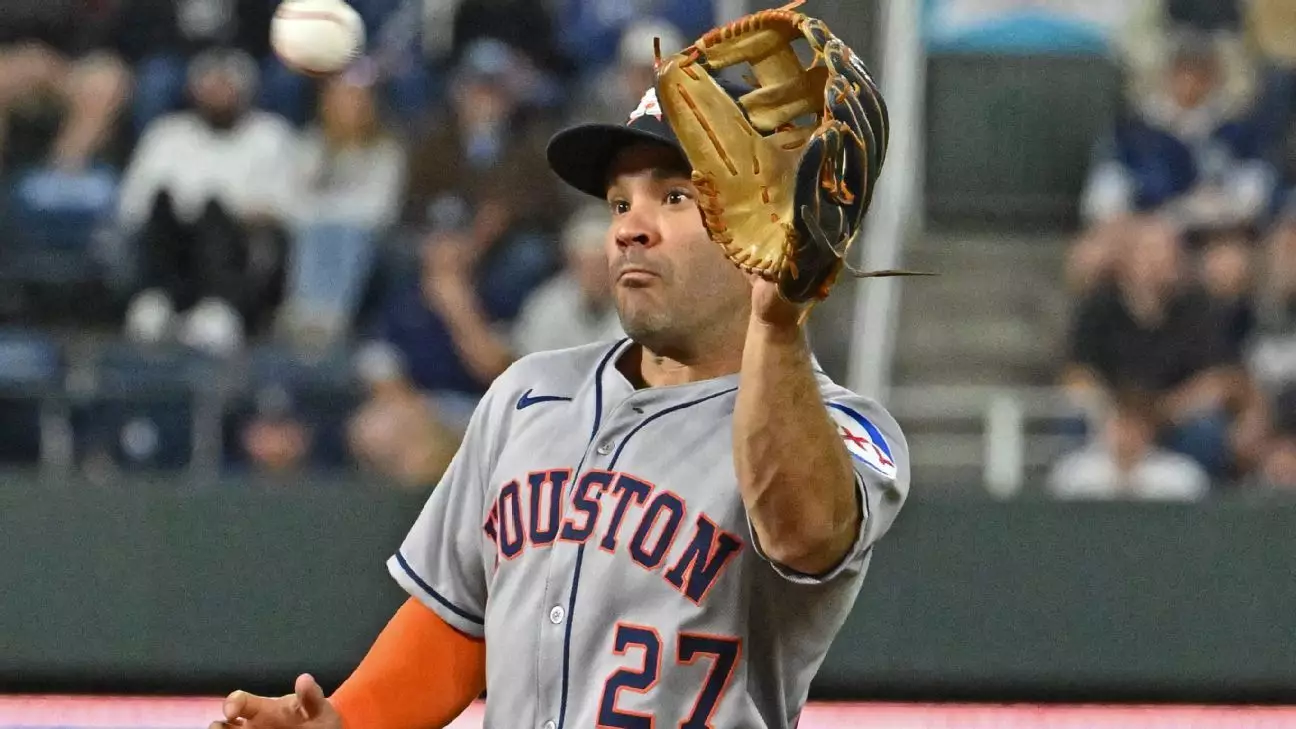In a notable move that highlights the intricate dynamics of a baseball team’s lineup, Jose Altuve, the Houston Astros’ celebrated second baseman, has made a surprising request to shift from the leadoff position to batting second. At 34 years old, Altuve is not just looking for a change of scenery; he is seeking a tactical advantage. With the recent restructuring of the Astros’ roster—marked by the departures of Kyle Tucker and Alex Bregman—Altuve has transitioned to playing left field for the first time in his prolific 14-year Major League Baseball (MLB) career. This decision was not merely personal; it brings into focus the delicate balance a team must maintain between individual performance and overall team strategy.
Altuve’s explanation for his change in batting order is rooted in practicality. He noted, “I just need like 10 more seconds,” a statement that underscores how even the slightest adjustments can significantly affect a player’s performance. By moving down in the lineup, Altuve positions himself to have a moment longer to regroup before stepping into the batter’s box, a detail that many fans may overlook but which seasoned players understand intimately.
Acknowledging the Rising Stars
In Altuve’s absence from the leadoff role, Jeremy Peña has been called upon to fill the gap. Peña’s recent performances—particularly a 2-for-4 outing against the Detroit Tigers—hint at his growing prowess as a formidable leadoff hitter. As Altuve himself pointed out, Peña is not just a player scraping by; he possesses explosiveness that can inject life into the Astros’ attack. With a .265 batting average along with three home runs and 11 RBIs this season, Peña has shown he can hold his own, and perhaps even elevate the team’s offensive strategies.
The significance of this transition isn’t just about stats; it speaks volumes about the camaraderie and mutual respect within the Astros’ clubhouse. Altuve’s decision not to specifically endorse Peña for the leadoff spot demonstrates a thoughtful approach to leadership. He is not merely stepping aside; he is empowering a junior player, allowing Peña to grow into a role that could define his career. This kind of mentorship is crucial in professional sports, where the pressure to perform can often stifle young talent.
The Bigger Picture: An Offensive Strategy
Altuve’s plea for a higher batting order slot is also symptomatic of a broader strategic shift needed within the Astros as they navigate a challenging season. With inconsistency marking their lineup, bringing Altuve into the second position could potentially spread the offensive threat more evenly throughout the batting order. By positioning himself behind Peña, Altuve might become a catalyst for driving in runs, especially with heavy hitters like Yordan Alvarez following him.
There’s an inherent wisdom in Altuve’s approach to his new role. Instead of focusing solely on personal stats, he is directing his energy toward maximizing the team’s performance. This selfless mentality, combined with his experience as a nine-time All-Star and 2017 AL MVP, sets a standard for what leadership looks like in the locker room. The ability to adapt while fostering a supportive environment for younger teammates might be what the Astros need to galvanize their season. Altuve’s evolution on the field is more than a positional change; it symbolizes a recalibration of priorities that could be crucial for the team.
Managerial Insights: Joe Espada’s Role
Taking a step back, manager Joe Espada’s openness to suggestions from Altuve reveals a progressive coaching style. It’s a refreshing departure from the traditionally rigid approach often seen in sports. Espada’s willingness to discuss strategies and player roles underscores a collaborative atmosphere, which is essential for maximizing team performance. This dialogue showcases the importance of building trust between players and management, allowing adjustments to be made in real-time based on immediate needs rather than preconceived notions or rigid lineups.
In a world where analytics often dictate decisions, this emphasis on human factors—like communication and the innate understanding players have of their own capabilities—offers a compelling case for a more nuanced approach to team strategies. Ultimately, it’s these small but significant adjustments that can lead to the Astros finding their rhythm and mounting a more competitive season.


Leave a Reply